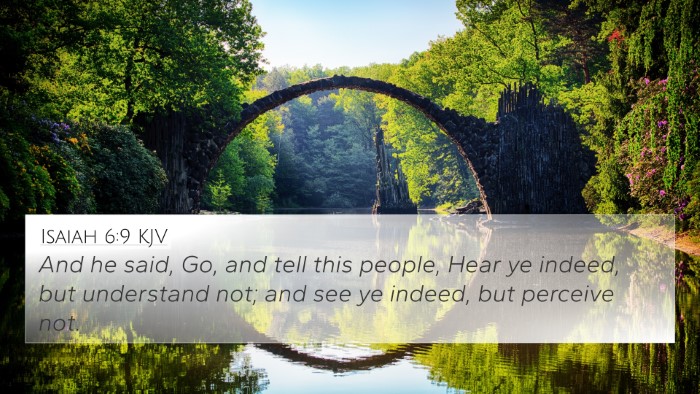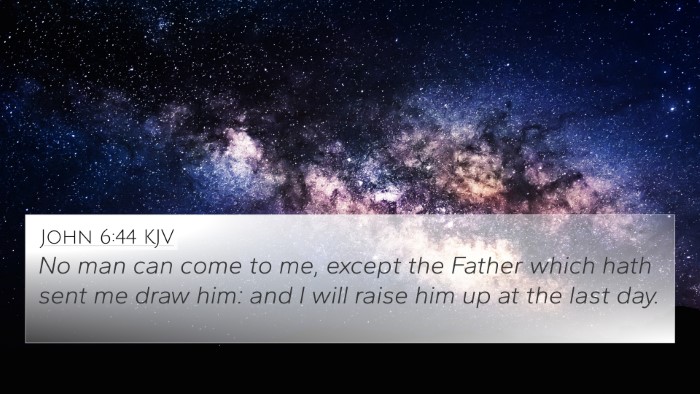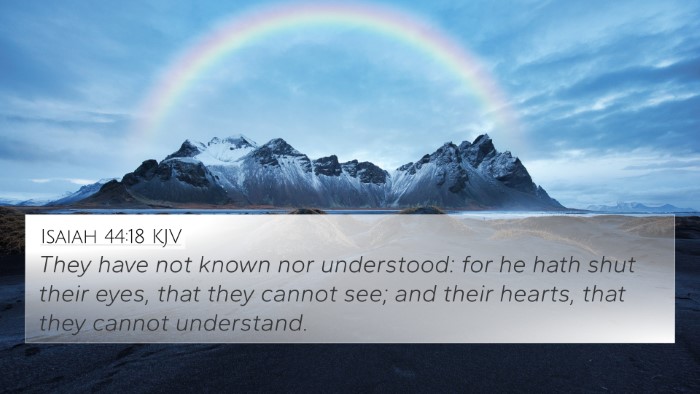Bible Verse Meaning: John 12:39
John 12:39 states: "Therefore they could not believe, because that Isaiah said again," This verse reflects a theme of spiritual blindness and the sovereignty of God's will in believing. Below, we explore the biblical interpretations and meanings presented by several public domain commentaries.
Summary of Insights
This verse serves to illustrate the hardening of hearts against the truth of Christ. The refusal to believe is attributed to God’s judgment, which echoes the prophetic words of Isaiah, indicating that the rejection of Jesus was prophesied and fulfilled in this time.
Commentary Insights
-
Matthew Henry:
Henry interprets this verse as a demonstration of the nature of unbelief and God’s role in it. He suggests that the people’s inability to believe stems from their own willful rejection of truth, reiterated by Isaiah's earlier prophecies. The reference to Isaiah conveys that it was always known that the Messiah would face disbelief.
-
Albert Barnes:
Barnes emphasizes that the phrase "they could not believe" indicates a state of being prevented from belief—a result of divine judgment for their persistent unbelief. He underscores that Isaiah’s prophecy serves as a warning about the consequences of rejecting God's message.
-
Adam Clarke:
Clarke elaborates on the connection between the rejection of Christ and the fulfillment of prophetic scripture. He highlights that the people's hearts were hardened, reflecting a divine decision due to their previous resistance to God's revelation.
Bible Cross References Related to John 12:39
- Isaiah 6:9-10: Jesus quotes Isaiah to illustrate the hardening of hearts.
- Romans 9:18: This passage speaks on God’s mercy and hardening of hearts.
- Matthew 13:14-15: A parallel teaching about the blindness of the people.
- 2 Corinthians 4:4: Discusses the god of this world blinding the minds of the unbelievers.
- John 10:26: Jesus mentions that they do not believe because they are not His sheep.
- John 5:39-40: The Jews search the Scriptures but refuse to come to Christ.
- Hebrews 3:7-11: A warning against hardening one's heart as the Israelites did.
Understanding Spiritual Blindness and Divine Sovereignty
John 12:39 reveals a profound understanding of the interplay between human will and divine sovereignty. The inability to believe does not negate the call to faith; rather, it highlights the tragic consequence of prolonged rejection of truth. This theme resonates throughout Scripture, emphasizing both God’s judgment and His righteousness.
Tools for Bible Cross-Referencing
Cross-referencing helps deepen understanding. Tools such as a Bible concordance or Bible cross-reference guide can enhance one’s ability to see these connections effectively.
How to Use Bible Cross-References
- Start by identifying a key verse, like John 12:39.
- Use a concordance to find parallel passages that connect thematically.
- Compare context, language, and general teaching to understand the broader message.
- Document your findings for further study and deeper understanding.
Conclusion
John 12:39 serves as a compelling reminder of the seriousness of belief, the reality of spiritual blindness, and the importance of responding to divine truth. The insights from the commentaries enrich our understanding, making cross-referencing an invaluable tool for studying the Scriptures.
Thematic Bible Verse Connections
By exploring the connections between various Bible verses, believers can gain a richer understanding of biblical themes such as faith, disbelief, and the consequences of rejecting God's word. Engaging in comparative Bible verse analysis promotes a holistic view of Scripture and fosters deeper faith.








